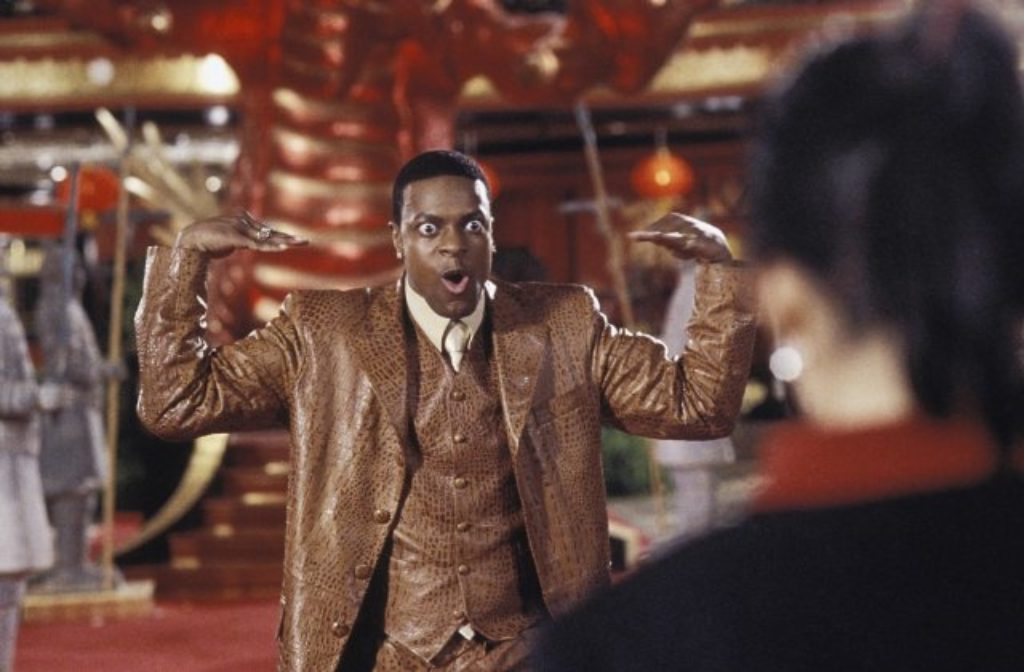
Rush Hour 2 picks up where Rush Hour left off. That might seem an obvious thing to say, but after summer sibling Jurassic Park III jumped from point A to point G to point B, nothing can be taken for granted in the sequel game. After cracking his first case on U.S. soil, Inspector Lee returns to China, and newfound cohort LAPD Detective James Carter takes a vacation to visit him. Carter is hoping for lots of down time interrupted only by beautiful Asian women, but gets caught up in one of Lee’s cases instead. The U.S. Embassy has been bombed, and two undercover customs officials killed. China’s most dangerous gang, the Fu-Cang-Long Triad is behind it. Racing against—or in cooperation with—the U.S. Secret Service (no one is sure which), Lee and Carter track Triad boss Ricky Tan, who’s responsible for laundering $100 million worth of counterfeit U.S. $100 “superbills.” By coincidence (there are no coincidences in action films), Tan is also the double-crossing former detective who killed Lee’s father. In the mix for good measure are hard-nosed henchwoman Hu Li (Ziyi Zhang of Crouching Tiger fame), a covert Spanish rose named Isabella and intricately choreographed kung-fu dizzying enough to give this critic a head rush.
positive content: Nobody watches a Jackie Chan movie for its rich characterization. There’s a reason for that. This time around, writers try to add depth to Chan’s character by tugging heartstrings with the story of Lee’s deceased father. It doesn’t work. But the theme they’re trying to convey is that Lee’s life has been profoundly affected by the death of his father, and that’s a noble message. Also, as co-workers and friends, Carter and Lee consistently respect and protect one another.
spiritual content: Hanging from a bamboo pole hundreds of feet above the street, Carter screams a half-serious prayer: “Lord Jesus, I don’t wanna die. Please help me live!”
sexual content: Most of the film’s women dress to impress or seduce. A few are shown in lingerie. Carter in particular has no qualms about ogling them. He and Lee visit a massage parlor where no one is fully clothed; Carter relishes a massage from four beautiful women. When a fight breaks out in the parlor, one man’s towel gets ripped off and his nakedness is shown from the rear. Carter and Lee are dumped from a gangster’s car and left nude on a Hong Kong highway (audiences see them from behind and from a distance). A flamboyantly gay retailer’s banter is played for laughs. Agent Isabella often uses her seductive powers to get her way on the job.
violent content: As can be expected, the story line of this film exists simply to string together a series of full-scale martial arts battles. Kicks, chops, flips and blocks abound. Hu Li spends the whole movie trying to do in Carter. She angers him so much that he tells her, “I ain’t never hit a woman in my life, but your a– is pushing it.” Several bombs go off, destroying property and at least three lives. (The deaths are not shown.) Tan is shot and falls from his yacht. Later, he falls several stories to his death. Isabella is shot, but not fatally. A rich American hotel owner is stabbed to death.
crude or profane language: Rush Hour 2 goes much lighter on the profanity than its predecessor, most notably cutting down uses of the s-word from 38 to six. Still, there’s plenty of foul language to go around. H— gets a pretty good workout (22 times); a– and d–n pop up almost as much. God’s name is misused half a dozen times, and there are a few uses of crude sexual slang.
drug and alcohol content: The agents’ work leads them into several clubs serving alcohol.
other negative elements: Tan’s money laundering takes place in a Vegas casino where Carter spends the better part of an evening at the craps table. Carter and Lee exchange numerous racial jokes. The jabs come across as lighthearted, affectionate banter between colleagues, but they may offend some viewers. Several times, Carter tries to get Lee’s mind off his work and onto other things. Rather than serving as a challenge to live a more balanced life, the younger agent’s entreaties play more as an advertisement for hedonism and instant gratification.
conclusion: Speaking last fall about his television cartoon program Jackie Chan Adventures, Chan stated, “We make a point not to make it ugly or violent … I don’t start fights. I defend myself. You don’t see blood. If it’s bad for kids, you don’t see it in this show. I tell kids violence is no good. [Kids] can have [excitement] without seeing blood or people getting hurt or killed. In the series, I do a lot of fancy stunts—leaping, jumping chasing, fighting bad men—many at a time. But you can do that in a way that’s fun and entertaining, not bloody or scary.” Though Rush Hour 2 doesn’t pretend to be geared toward kids, some semblance of this philosophy shows up in the film. In contrast with the slow-mo violence popularized by films like The Matrix, Chan-style fight scenes don’t invite viewers to dwell on gore or injury. All of the good guys’ actions are indeed defensively rather than offensively motivated. So it’s not that Rush Hour 2’s violence is graphic or over-the-top. It’s just that there’s so much of it. That, a moderate dose of immodesty and offensive language should keep families from trying to beat the traffic to see this film.
